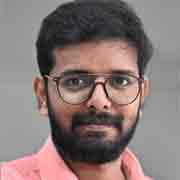Saksham Garg’s ‘Samsara’ tries to reinvent Hinduism for a divisive world

Mail This Article
A youngster on the streets fighting the Citizenship (Amendment) Act, challenged by the liberal intelligentsia for its perceived anti-Muslim motives, and writing a novel on the soft powers of Hinduism once he is back home could be a paradox in present-day India.
Delhi-based Saksham Garg, 27, is that paradox personified. And to the skeptics who would have possibly smelled an irony in his activism and his art, he flaunts his book “Samsara: Enter The Valley Of The Gods” – a work of fiction that tries to address one of the overarching problems of the contemporary world; religious divisiveness.
Twelve days after it was launched, the book published by Penguin, where Garg works as an editor, is getting rave reviews from India’s fiction fans. 'Samsara', according to its author, is the first Indian upmarket fiction that has world building as a key element. ‘World building’ in the literary glossary is used to refer to the creation of an entirely new fictional world.
Reinventing real Hinduism
Garg, born and brought up in a pious Hindu family in Delhi, draws his setting and characters from ancient Indian mythology, while his theme and the message embedded in it come straight out of today’s harsh and depressing realities.
‘Enter The Valley Of The Gods’ is the first installment of the Samsara trilogy that Garg started writing 10 years ago when he was in Class 11.
The plot of the novel, which has been hailed as “India’s answer to Harry Potter” by celebrated young author Krishna Udayasankar, revolves around some strange incidents in the life of Aman Chandra and 10 others who are kidnapped from modern-day India and transported to a hidden valley in the Himalayas. What thereafter unfolds is a magical world of Hindu gods, immortal yogis, and mythical beasts.
The mysteries of the world called Vanyasa and the charming intricacies of the yogic sorcery make it a perfect mix of “Harry Potter” and “Immortals of Meluha”.
“The book is centred around the Rig Veda which is the oldest sacred text of the oldest religion in the world. We have come from the pure classical Hinduism of thousands of years ago to a warped modern variant of the religion. Through this book, I’m trying to remind everyone of the forgotten tenets of Hinduism. It holds a mirror to the state of the religion today,” Garg told Onmanorama in Kochi. He is in Kerala to promote his book.
Ruing the violence in the name of gods and religion that has been increasing worldwide, the writer said, “there’s less salvation and more killing now.”

“The idea of god around the world now serves a purpose exactly opposite what it was meant to be,” he said. He exuded confidence that the subject his novel deals with would attract the reading community in Kerala, which is known for its progressive ideals.
Asked about the possible prejudices against the genre of mythological fiction, he said he has chosen the setting to communicate with all sorts of readers. “It is important to engage with the right wing to challenge the ideas they believe in,” he said.
A decade of writing and rewriting
Garg started writing 'Samsara' when he was a student of Woodstock School, Mussoorie, from where he could see the snow-capped Seven Hills of his novel. He finished the first draft in 2011.
In 2013, he broke his leg during a football match and remained bedridden for a year. “I cried for a month and spent the remaining 11 months refining the first draft of my novel,” Garg remembered.
From 2013 to 2018, by the time he finished his bachelor’s in Economics from Hindu College, Delhi, he reworked the draft umpteen times. In 2018, he joined Penguin Random House India as an assistant editor; a job he grabbed only because he wanted to be a fiction editor to learn the art of improving a work of fiction.
In December 2021, he submitted to his own company what the publishing industry calls ‘an ideal editor’s book proposal’. The book was released on September 26 this year.
Garg is co-authoring the next two installments of the 'Samsara' trilogy with his school-time friend and screenwriter Aditya Goyal. The books are expected to be released in December 2023 and December 2024.
Garg does not follow any particular routine when it comes to writing. “I would start writing only when I feel like I’m physically present in Vanyasa,” he said. The fact is he is so engrossed in his work of fiction that, he confesses, at times he feels like that’s the real world and what he sees around is all imaginary.


